Whether you're a business owner, manager, or someone running their own business, the idea of offering professional services for a bit of extra cash or hiring a professional to work with you is well worth thinking about.
We live in such a world where you can access talent from all over the world and the opportunities are pretty much limitless. Whatever you want to do, build, create, or offer, it's all possible with just a computer and internet connection.
One of the leading platforms for freelance activity, both selling services and finding top talent, is Fiverr.
Made famous by the notion that you could buy any service or product for just $5 (although that's changed a lot these days), it's a great platform to get started.
However, modern Fiverr can be a bit of a jungle.
Millions of freelancers are vying for attention, often driving prices down to rock bottom.
This is bad for sellers who don't get to make much money and bad for buyers because it's hard to know which sellers are offering the best quality service that suits your needs.
Since it doesn't look like it's changing any time soon, are there any alternatives out there?
There is, and that's what we're looking into today as we walk through the top Fiverr alternatives, as well as sharing some insider tips to get the most out of the platforms.
Let's just get on with it.
What is Fiverr?
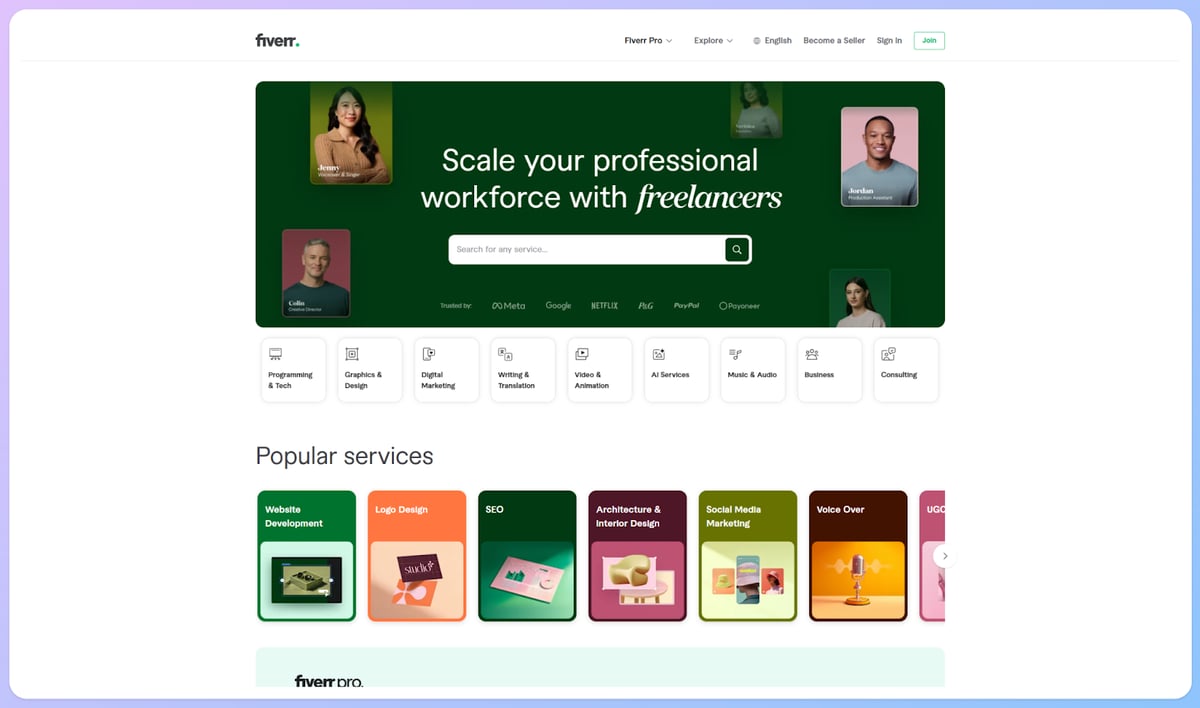
Fiverr is basically a giant online marketplace where you can find freelancers offering all sorts of digital services. Think logo design, website development, writing, voiceovers, you name it – someone on Fiverr probably does it.
The platform got its name because, initially, every service was offered for just five bucks. (Crazy, right?) These days, though, freelancers can set their own prices, and many offer different packages with varying levels of service.
Fiverr works like this:
- Freelancers create "gigs," essentially listings showcasing their skills and services.
- Clients browse these gigs and choose the freelancer that best fits their needs and budget.
- Once a client orders a gig, the freelancer completes the work and delivers it through the platform.
- Fiverr holds the funds until the client approves the work, ensuring some level of security for both parties.
Sounds pretty straightforward, yeah? But as with anything, there's more to the story...
Why look for Fiverr alternatives?
While Fiverr has certainly made freelancing more accessible, it's not without its drawbacks. Here are a few reasons why you might want to explore other platforms:
- High competition: With millions of freelancers on Fiverr, it can be tough to stand out, especially when starting.
- Fees: Fiverr takes a 20% cut of your earnings on each transaction. Plus, buyers pay fees on each order, so Fiverr is making money from both parties at the same time.
- Race to the bottom: The intense competition often leads to a "race to the bottom" in terms of pricing, making it harder to earn a decent income.
- Quality concerns: While there are many talented freelancers on Fiverr, the platform's open nature means there's also a lot of variability in quality.
Don't get me wrong, Fiverr can be a useful tool, especially for finding quick, low-cost services or getting your feet wet as a new freelancer.
But for those seeking higher-paying gigs, more specialized platforms, or a less crowded marketplace, exploring alternatives is a smart move.
What are the top alternatives to Fiverr?
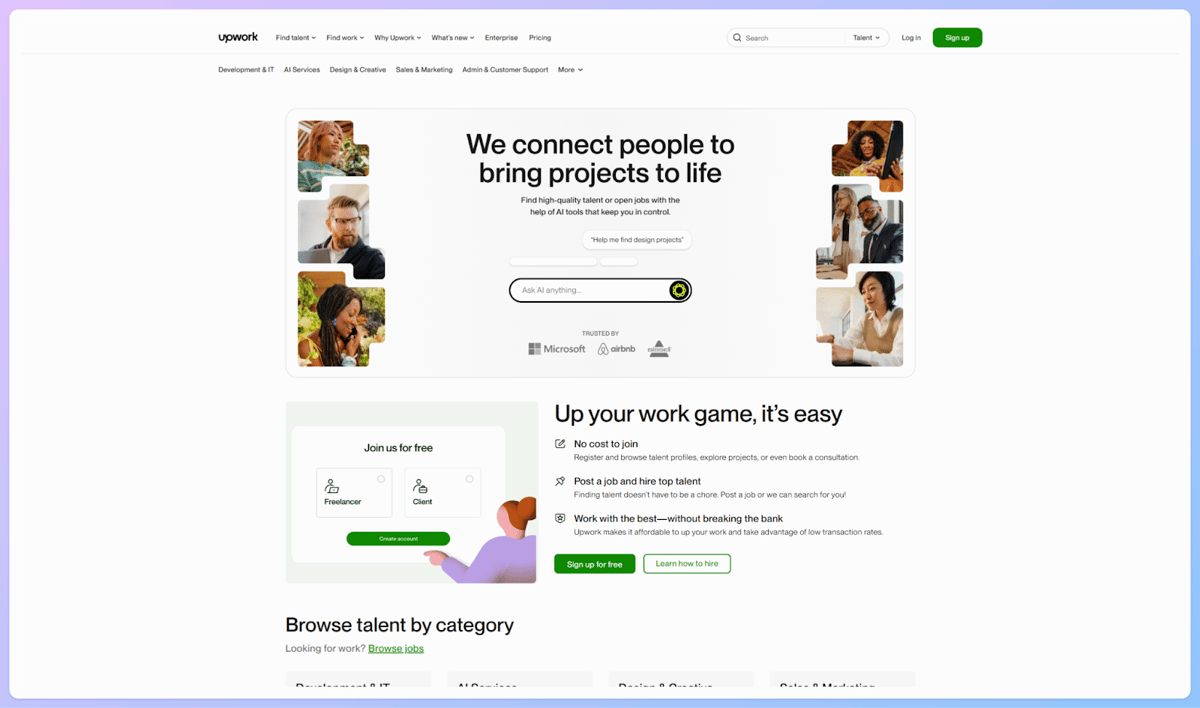
Upwork
If you've spent any time in the freelancing world, you've probably heard of Upwork. It's one of the largest and most established platforms out there, boasting a massive global network of freelancers and clients.
- Overview: Upwork offers a wide range of project categories, from writing and design to development and marketing. It features a sophisticated search and filtering system, allowing you to find the perfect freelancer or project. They also have a robust time-tracking tool and payment protection system to ensure both parties are safe and sound.
- Pros: Huge talent pool, diverse project categories, strong reputation, secure payment system.
- Cons: Can be competitive, fees can be high for freelancers, and sometimes a longer hiring process.
- Best For: Established freelancers, businesses looking for a wide range of skills, and projects of all sizes.

If you're looking for expert help in tech, business, or design, you should take a look at MentorCruise. It’s a leading mentorship platform that connects ambitious professionals with experienced mentors across a variety of industries.
With flexible pricing, structured mentorship plans, and seamless communication tools, it’s designed for long-term professional growth.
- MentorCruise offers 1-on-1 mentorship for skills like software engineering, product management, entrepreneurship, and more. The platform allows mentees to find mentors based on expertise, availability, and pricing, making it easy to get tailored career guidance.
- Pros: Wide range of mentors, flexible pricing, structured mentorship programs, easy communication.
- Cons: Finding the right mentor may take some trial and error, and top mentors can be in high demand.
- Best For: Aspiring professionals, career changers, entrepreneurs, and anyone looking for expert guidance to accelerate their growth.
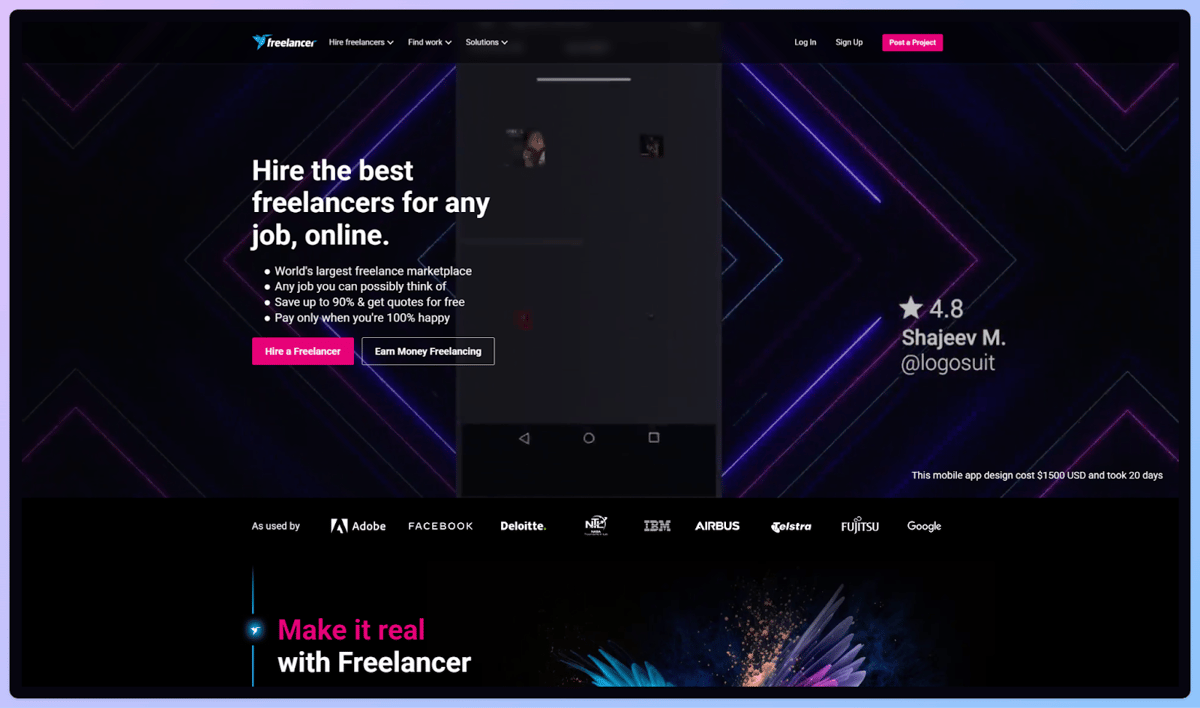
Freelancer.com
With a name like Freelancer.com, you know exactly what you're getting. This platform is another major player in the freelance arena, known for its competitive bidding system and vast project variety.
- Overview: Freelancer.com hosts a massive database of freelancers across virtually every industry. It offers a user-friendly interface, a contest-based project system, and a diverse range of payment options.
- Pros: Wide range of projects, competitive bidding system, large community, good for beginners.
- Cons: Can be overwhelming for new users, potential for low-quality bids, customer support can be slow.
- Best For: Budget-conscious clients, freelancers looking for various projects, and those comfortable with competitive bidding.

Toptal
Toptal takes a different approach, focusing on connecting clients with the top 3% of freelance talent. They have a rigorous screening process, ensuring only the most skilled and experienced freelancers make the cut.
- Overview: Toptal specializes in connecting businesses with elite software developers, designers, finance experts, and project managers. They offer a personalized matching service and a no-risk trial period for clients.
- Pros: High-quality talent, rigorous screening process, dedicated support, ideal for high-end projects.
- Cons: Higher price point, limited to specific fields, not ideal for small projects or beginners.
- Best For: Businesses seeking top-tier talent, experienced freelancers with strong portfolios, complex and high-budget projects.
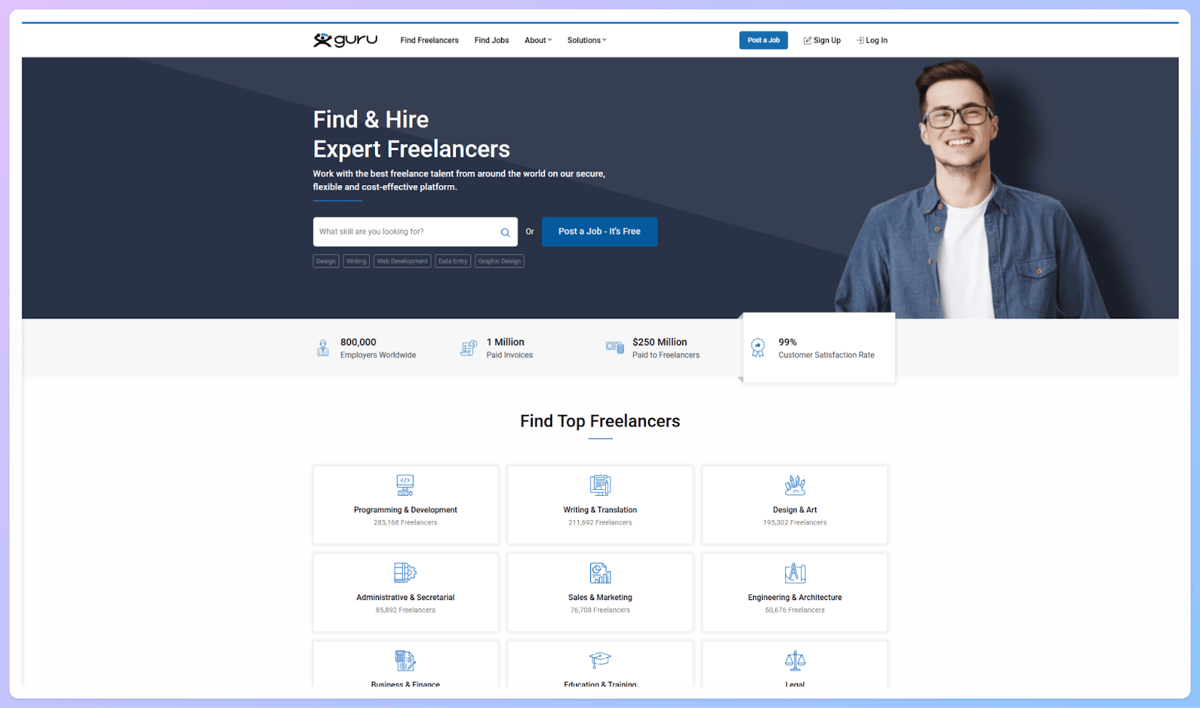
Guru
Guru is a well-established platform emphasizing direct communication and collaboration between freelancers and clients.
- Overview: Guru offers a wide range of project categories, a user-friendly interface, and a focus on building long-term relationships. They have a safe payment system and offer a money-back guarantee for clients.
- Pros: Strong emphasis on communication, diverse project categories, money-back guarantee, good for long-term projects.
- Cons: Can be less competitive than other platforms, interface may feel dated, not as many advanced features.
- Best For: Clients seeking direct communication with freelancers, freelancers who value long-term relationships, and projects requiring close collaboration.
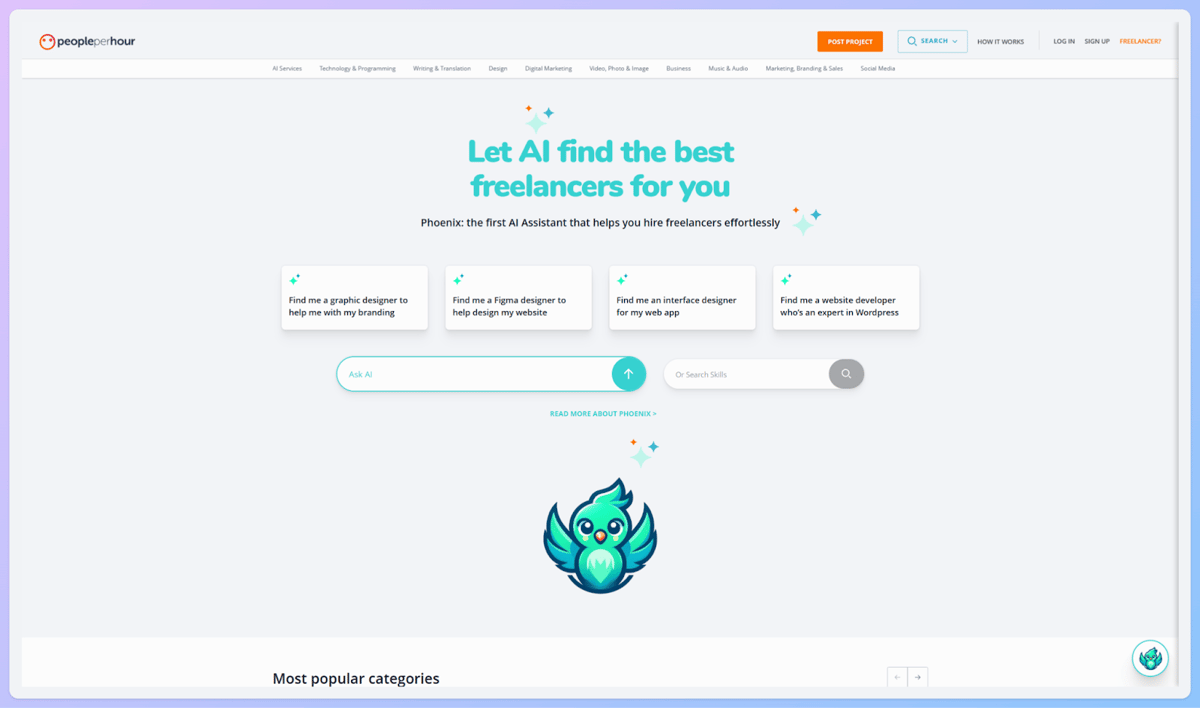
PeoplePerHour
PeoplePerHour is a UK-based platform that's been around for a while. It is known for its focus on hourly projects and its "Hourlies" feature, which allows freelancers to offer pre-packaged services.
- Overview: PeoplePerHour offers a wide range of project categories, a user-friendly interface, and a strong focus on time management. They have a secure payment system and offer escrow services for added protection.
- Pros: Good for hourly projects, "Hourlies" feature simplifies service offerings, strong focus on time tracking.
- Cons: Smaller user base compared to giants like Upwork, can be more expensive for clients, not as many advanced features.
- Best For: Freelancers who prefer hourly rates, clients with well-defined projects, businesses seeking UK-based talent.
What are some of the niche freelance platforms?

Sometimes, it's best to go with a specific freelancing platform when you're searching for something niche and, well, specific. It's where the top talent go to buy and sell their services, and you're much more likely to find the best of the best.
For designers
- 99designs: This platform is a haven for graphic designers, hosting design contests where clients can receive a variety of concepts from different designers. It's a great way to get multiple ideas and choose the best fit.
- Dribbble Hiring: Dribbble is a popular platform for designers to showcase their work. Their hiring section allows businesses to connect with top-tier designers for freelance or full-time roles.
For writers
- WriterAccess: This platform connects businesses with a pool of pre-vetted writers specializing in various content types, from blog posts and articles to website copy and marketing materials.
- ProBlogger: This website is a hub for bloggers and freelance writers. It features a job board with a wide range of writing gigs, from guest blogging opportunities to long-term content creation projects.
For developers
- Toptal: (Yes, Toptal again!) While I mentioned it earlier, it's worth emphasizing that Toptal is a top choice for finding highly skilled developers in various specializations.
- Gun.io: This platform focuses on connecting businesses with vetted freelance developers for software development projects. They have a strong emphasis on quality and offer a risk-free trial period.
For marketers
- MarketerHire: This platform specializes in connecting businesses with pre-vetted marketing professionals, including SEO experts, content marketers, and social media managers.
- Credo: Credo helps businesses find and hire vetted marketing agencies and consultants for various marketing needs.
For virtual assistants
- Time Etc: This platform offers access to a network of virtual assistants who can handle various tasks, from administrative support and scheduling to social media management and customer service. UK based.
- Fancy Hands: Fancy Hands provides on-demand virtual assistant services for businesses and individuals. They offer a subscription-based model with a set number of tasks per month. US-based.
What factors to consider when choosing a platform

How do you decide which sites like Fiverr best suit you and your business? Well, there are a few things to think about.
Fees and pricing structure
This is a biggie. Each platform has its own way of handling fees. Some take a percentage of your earnings, while others charge membership fees or project fees. Pay close attention to these structures to make sure they align with your budget and financial goals.
Project types and scope
Not all platforms are created equal when it comes to the types of projects they host. Some specialize in short-term gigs, while others are geared towards larger, ongoing projects.
Think about the kind of work you're looking for or offering, and choose a platform that caters to those needs.
Client base and industry focus
Some platforms attract a specific type of client or focus on certain industries. If you have a niche expertise or prefer working with a particular type of client, look for platforms that align with your preferences.
Platform features and tools
Different platforms offer different features and tools to enhance your experience. Some have robust time-tracking systems, while others have built-in communication tools or project management features.
Consider which features are important to you and choose a platform that offers them.
Community and support
A strong community and reliable support can be invaluable, especially when you're starting out. Look for platforms with active forums, helpful resources, and responsive customer support.
FAQs
What is the best Fiverr alternative for beginners?
For newbies, I'd recommend Freelancer.com. It's user-friendly, has a vast range of projects, and the competitive bidding system can be a good way to gain experience and build your portfolio.
Upwork is super competitive, but if you get a good start (perhaps bringing on a client from elsewhere and getting them to leave a review, you can make it work with momentum).
Are there any free Fiverr alternatives?
Most platforms have some free features, but they usually involve limitations. Upwork has a free plan, but you'll have limited "connects" (which are used to apply for jobs). Freelancer.com also has a free plan, but you'll have a limited number of bids.
How do I avoid scams on freelance platforms?
Always communicate and make payments through the platform's secure system. Be wary of clients who ask you to work outside the platform or offer unusually high pay for simple tasks. Read reviews and check client profiles before accepting any offers.
How much can I earn on sites like Fiverr?
Ah, the million-dollar question! Earnings vary wildly depending on your skills, experience, niche, and the platform you choose. Some freelancers earn a few extra bucks a month, while others make a full-time living.
It takes time, dedication, and a bit of hustle to build a successful freelance career.
Wrapping up
So, there you have it – a rundown of the best sites like Fiverr to help you navigate the current freelance landscape.
Whether you're a seasoned freelancer looking for better opportunities or a client seeking top-tier talent, there's a platform out there that's perfect for you and there are so many choices, it's a really good place to be.
Remember, the key is to choose a platform that aligns with your needs, preferences, and goals. Consider factors like fees, project types, client base, and platform features to find the perfect fit.
Don't be afraid to explore different options and experiment until you find your freelance haven.
Best of luck!







